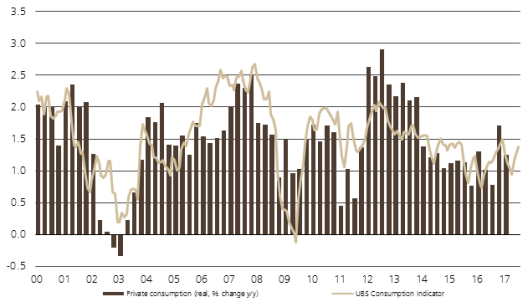The Swiss consumption indicator by UBS shows improvements. The indicator is still distant from the highs in 2012. At the time stronger growth in Emerging Markets and the weaker franc helped the Swiss economy.
Private consumption vs. UBS Consumption IndicatorUBS consumption indicator printed 1.38 in June, pointing to subdued growth in Swiss private consumption in recent months. Relatively weak growth in employment was much to blame for the lackluster number, however this was offset somewhat by robust new car registrations data and overnight hotel stays by Swiss nationals. The UBS consumption indicator came in at 1.38 points in July, suggesting that private consumption in Switzerland is growing at a subdued pace. The indicator was held back by the relatively weak growth in employment and the fall in new car registrations compared with the previous year. The fall in the value of the franc may have a slightly positive effect on consumption. Zurich, 30 August 2017 – The UBS consumption indicator stood at 1.38 points in July, suggesting that the third quarter started with a level of consumption growth that is slightly below the long-term average. This aligns with the forecasts of UBS Chief Investment Office Wealth Management, which forecasts that consumption in private households would grow by 1.3% in 2017. The relatively weak level of employment growth in recent quarters remains a burden on consumption. In July, the consumption indicator was also negatively influenced by new car registrations, which fell by 4.6% year-on-year. With only 24,885 new registrations for the month, car sales were lower than at any other month since 2009. The weaker figures from the car market were offset by the number of overnight hotel stays by Swiss nationals. The 1.41 million overnight stays recorded in July represent an increase of 9.4% from the previous year, and also set a new record for the month. The fall in the value of the Swiss franc in recent months is expected to lead to higher inflation, potentially limiting the purchasing power of households. On the other hand, the devaluation enhances the competitiveness of retail trade and tourism in Switzerland relative to neighboring countries. On the whole, the weaker franc could have a slightly positive effect on Swiss consumption growth. |
UBS Consumption Indicator July 2017(see more posts on Switzerland Private Consumption, Switzerland UBS Consumption Indicator, ) Source: ubs.com - Click to enlarge |
How the UBS Consumption Indicator is calculated
The UBS Consumption Indicator signals private consumption trends in Switzerland with a lead time of one to three months on the official figures. At more than 50%, private consumption is by far the most important component of Swiss GDP. UBS calculates this leading indicator from six consumer-related parameters: new car registrations, business activity in the retail sector, the number of domestic overnight hotel stays by Swiss residents, the consumer sentiment index, employment figures and credit card transactions made via UBS at points of sale in Switzerland. With the exception of the consumer sentiment index and employment figures, all of this data is available monthly.
Are you the author? Previous post See more for Next postTags: newslettersent,Switzerland Private Consumption,Switzerland UBS Consumption Indicator







































